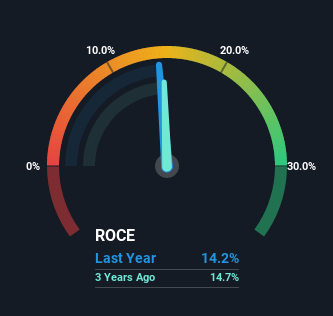- United Kingdom
- /
- Specialty Stores
- /
- AIM:WRKS
Returns On Capital Signal Tricky Times Ahead For TheWorks.co.uk (LON:WRKS)

Did you know there are some financial metrics that can provide clues of a potential multi-bagger? One common approach is to try and find a company with returns on capital employed (ROCE) that are increasing, in conjunction with a growing amount of capital employed. Ultimately, this demonstrates that it's a business that is reinvesting profits at increasing rates of return. However, after briefly looking over the numbers, we don't think TheWorks.co.uk (LON:WRKS) has the makings of a multi-bagger going forward, but let's have a look at why that may be.
Return On Capital Employed (ROCE): What Is It?
If you haven't worked with ROCE before, it measures the 'return' (pre-tax profit) a company generates from capital employed in its business. To calculate this metric for TheWorks.co.uk, this is the formula:
Return on Capital Employed = Earnings Before Interest and Tax (EBIT) ÷ (Total Assets - Current Liabilities)
0.14 = UK£15m ÷ (UK£171m - UK£63m) (Based on the trailing twelve months to May 2022).
So, TheWorks.co.uk has an ROCE of 14%. That's a relatively normal return on capital, and it's around the 13% generated by the Specialty Retail industry.
See our latest analysis for TheWorks.co.uk

In the above chart we have measured TheWorks.co.uk's prior ROCE against its prior performance, but the future is arguably more important. If you'd like, you can check out the forecasts from the analysts covering TheWorks.co.uk here for free.
How Are Returns Trending?
When we looked at the ROCE trend at TheWorks.co.uk, we didn't gain much confidence. To be more specific, ROCE has fallen from 18% over the last five years. Although, given both revenue and the amount of assets employed in the business have increased, it could suggest the company is investing in growth, and the extra capital has led to a short-term reduction in ROCE. And if the increased capital generates additional returns, the business, and thus shareholders, will benefit in the long run.
On a side note, TheWorks.co.uk has done well to pay down its current liabilities to 37% of total assets. That could partly explain why the ROCE has dropped. What's more, this can reduce some aspects of risk to the business because now the company's suppliers or short-term creditors are funding less of its operations. Some would claim this reduces the business' efficiency at generating ROCE since it is now funding more of the operations with its own money.
Our Take On TheWorks.co.uk's ROCE
In summary, despite lower returns in the short term, we're encouraged to see that TheWorks.co.uk is reinvesting for growth and has higher sales as a result. Furthermore the stock has climbed 44% over the last three years, it would appear that investors are upbeat about the future. So while investors seem to be recognizing these promising trends, we would look further into this stock to make sure the other metrics justify the positive view.
One final note, you should learn about the 3 warning signs we've spotted with TheWorks.co.uk (including 1 which is potentially serious) .
If you want to search for solid companies with great earnings, check out this free list of companies with good balance sheets and impressive returns on equity.
Valuation is complex, but we're here to simplify it.
Discover if TheWorks.co.uk might be undervalued or overvalued with our detailed analysis, featuring fair value estimates, potential risks, dividends, insider trades, and its financial condition.
Access Free AnalysisHave feedback on this article? Concerned about the content? Get in touch with us directly. Alternatively, email editorial-team (at) simplywallst.com.
This article by Simply Wall St is general in nature. We provide commentary based on historical data and analyst forecasts only using an unbiased methodology and our articles are not intended to be financial advice. It does not constitute a recommendation to buy or sell any stock, and does not take account of your objectives, or your financial situation. We aim to bring you long-term focused analysis driven by fundamental data. Note that our analysis may not factor in the latest price-sensitive company announcements or qualitative material. Simply Wall St has no position in any stocks mentioned.
About AIM:WRKS
TheWorks.co.uk
Engages in the retailing of art and craft products, stationery, toys, games, books, gifts, and seasonal products in the United Kingdom and Ireland.
Proven track record slight.
Similar Companies
Market Insights
Community Narratives



